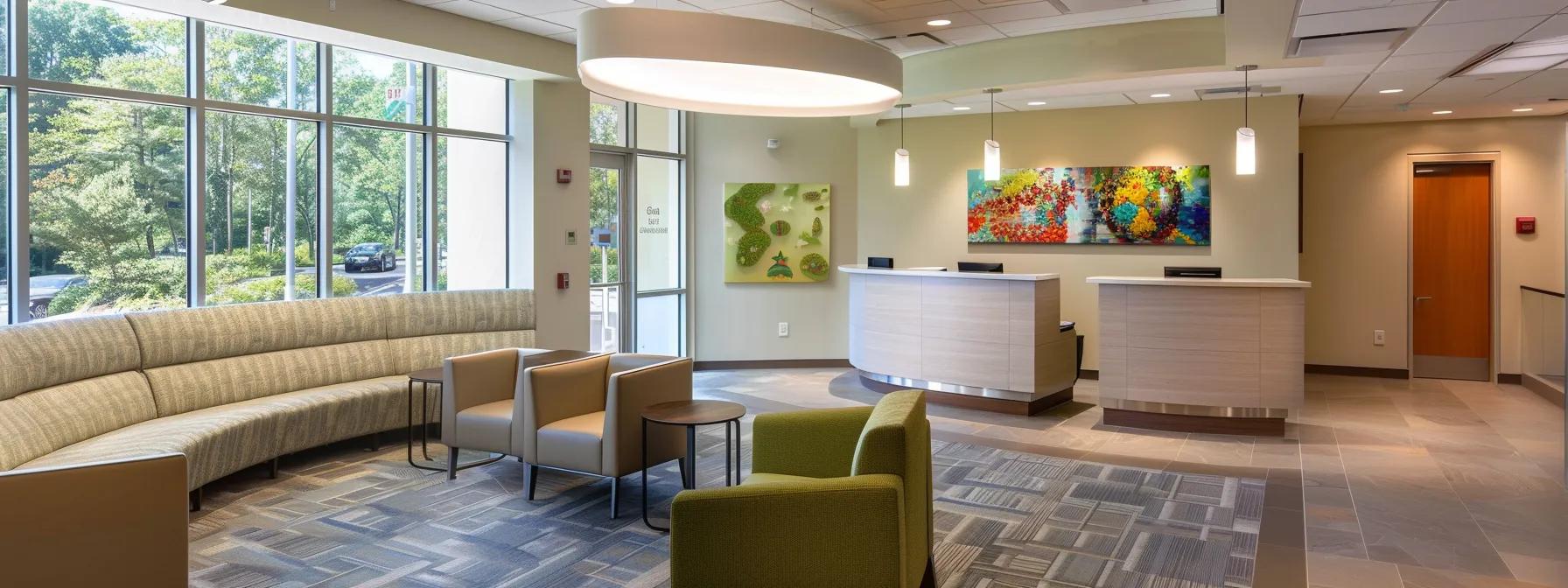Table Of Contents:
- A Comprehensive Guide to Selecting the Right Addiction Treatment Center in Massachusetts
- Understanding Your Specific Needs for Addiction Treatment in Massachusetts
- Researching Different Types of Addiction Treatment Programs in Massachusetts
- Key Factors to Evaluate When Selecting a Massachusetts Recovery Center
- How to Choose the Best Addiction Treatment Center in Massachusetts Based on Practical Considerations
- Making an Informed Decision for Addiction Recovery in Massachusetts
- Next Steps After Choosing an Addiction Treatment Center in Massachusetts
- Frequently Asked Questions
A Comprehensive Guide to Selecting the Right Addiction Treatment in MA
Addiction recovery is a complex journey that requires careful planning, understanding of personal needs, and thorough research before selecting the ideal treatment center. To begin your journey, remember to findyourstrength and explore your options thoroughly. Addiction Treatment in in MA today, there are many options for individuals in need of help with substance abuse disorders. Strength Recovery Services, among others, offers a range of evidence-based services suited for those suffering from drug and alcohol addiction. Choosing the most appropriate treatment program—such as those recommended by treatment-recovery—can significantly impact one’s recovery journey, long-term sobriety, and overall wellness. This comprehensive guide is designed for individuals, families, and loved ones to help them navigate the key aspects of selecting an addiction treatment center by assessing personal needs, comparing treatment programs, and evaluating practical considerations. By understanding the type of services available – from inpatient and residential care to outpatient programs such as PHP and IOP – patients can identify the facility that best matches their condition and lifestyle.
The need for individualized treatment has never been more pressing. Different patients may require different levels of care depending on the substances they use, any co-occurring mental health conditions, and their personal responsibilities. It is essential to examine not only the treatment options offered, but also the qualifications and expertise of the clinical staff, the facility’s environment, and the long-term success rates of their programs. In the Addiction Treatment Massachusetts context, every treatment center offers distinct methodologies and approaches, which range from pharmacotherapy and cognitive behavioral therapies (CBT) to holistic practices and family support groups.
Furthermore, consideration of the facility’s location, accessibility, and available insurance coverage is crucial because these factors directly influence how smoothly a patient can transition into active recovery. As recovery is not solely about undergoing treatment but also establishing long-term sobriety with community and family support, patients are encouraged to arrange virtual tours and speak with former patients. This article delves into each of these aspects, offering detailed guidance and insights into making an informed recovery decision in Massachusetts.
Transitioning into the main content, the following sections will provide specific strategies and evaluative measures that will empower patients and their families when choosing the best addiction treatment center in Massachusetts.
Understanding Your Specific Needs for Addiction Treatment in Massachusetts
Understanding your unique needs for addiction treatment is the first critical step in starting your recovery journey. Every patient’s experience with substance abuse is different, and a tailored treatment plan can ensure that both the mental and physical aspects of addiction are addressed. The process begins by evaluating the substances used, any co-occurring mental health conditions, the level of care required, and personal responsibilities that may affect treatment outcomes.
Identifying the Substances Used and a History of Use
A clear history of substance use, including the types of drugs or alcohol, frequency of use, and the duration of the addiction, is essential in choosing a suitable treatment plan. The treatment process must be designed to address the specific biological and psychological effects associated with each substance. For example, opioid addiction requires a different therapeutic approach compared to alcohol abuse. By knowing the patient’s personal history, clinicians can tailor interventions such as medication-assisted treatment (MAT) or cognitive behavioral therapy. Detailed information regarding dosage, withdrawal symptoms, and duration of dependence plays a pivotal role in determining detoxification needs and subsequent levels of care.
Assessing for Co-Occurring Mental Health Conditions
Co-occurring mental health issues, such as depression, anxiety, or bipolar disorder, often complicate addiction treatment and require integrated therapeutic approaches. Assessment by qualified mental health professionals helps define whether simultaneous treatment for a mental health disorder is necessary. An effective addiction treatment Massachusetts will provide dual diagnosis treatment, ensuring patients receive comprehensive care that addresses both the substance abuse and the underlying or co-occurring psychiatric conditions. This integrated approach enhances recovery odds, improves long-term outcomes, and reduces relapse risks.
Determining the Appropriate Level of Care Required
Patients often vary in the level of care they require, from outpatient support to intensive inpatient programs. Critical factors include the severity of addiction, withdrawal risk, and overall health. Some patients might benefit from a structured environment provided by residential treatment programs while others might find outpatient services, such as partial hospitalization programs (PHP) or intensive outpatient programs (IOP), more compatible with their daily responsibilities. A patient’s level of motivation, support system, and co-existing medical conditions can further dictate the appropriate level of care. By accurately categorizing these factors, treatment centers can design personalized care plans that address immediate needs and establish long-term recovery goals.
Considering Personal Responsibilities and Support Systems
Personal responsibilities, such as caring for children, employment, or other family commitments, must be taken into consideration when planning for addiction treatment. A center that offers flexible scheduling or outpatient services might be more appropriate for individuals with significant day-to-day responsibilities. In addition, family support can play a critical role in recovery; centers that offer family therapy or support groups create an environment that fosters transparency and healing. Understanding and incorporating these elements ensures that the recovery process does not disrupt essential personal and professional obligations, facilitating a smoother integration of treatment into daily life.
How Do I Choose the Best Addiction Treatment Center in Massachusetts for My Unique Situation?
The final determination on how to choose the best center involves synthesizing all the individual factors—substance use history, mental health conditions, level of care, and personal logistics. It is important for patients to compare the clinical approaches, treatment methodologies, and tangible outcomes of various centers. For example, Strength Recovery Services offers specialized programs that integrate pharmacotherapy with holistic therapies, making them a valuable option for patients whose addiction is compounded by mental health issues. Comprehensive evaluations, including patient testimonials, clinical outcomes, and aftercare planning, provide a pathway toward selecting the facility that best meets your unique recovery needs.
Researching Different Types of Addiction Treatment Programs in Massachusetts

Once you understand your specific needs, the next step is researching the various types of addiction treatment programs available in Massachusetts. The state offers a spectrum of treatment models that are designed to cater to diverse recovery paths, from rigorous inpatient settings to more flexible outpatient programs. Each program type has its own methodologies, advantages, and follow-up care, and sufficient research can ensure that patients and their families are well-informed of their options.
Exploring Inpatient and Residential Treatment Options in Massachusetts
Inpatient and residential treatment programs provide an immersive recovery experience by creating a controlled environment where patients can focus solely on recovery without external disturbances. These programs usually offer 24-hour supervision, structured schedules, and personalized therapies tailored to individual recovery needs. Evidence suggests that residential treatment can lead to significant improvements in sobriety rates, particularly for individuals with severe addictions or co-occurring disorders. Moreover, these programs frequently include additional support services such as nutrition counseling, exercise programs, and recreational therapy. A well-rounded residential treatment program not only stabilizes patients during the critical withdrawal phase but also provides intensive, round-the-clock care that can significantly enhance long-term recovery prospects.
Investigating Outpatient Programs Including PHP and IOP in Massachusetts
Outpatient treatment programs, which include Partial Hospitalization Programs (PHP) and Intensive Outpatient Programs (IOP), allow patients to receive treatment while maintaining their regular daily commitments. PHPs typically involve multiple hours of therapy per day over several weeks, while IOPs provide support in shorter sessions several days a week. These programs are particularly beneficial for individuals who have a strong support system at home or for those who cannot commit to an inpatient program due to personal responsibilities. The structure of these programs is designed to deliver comprehensive therapeutic interventions while offering the flexibility necessary for patients to continue working or studying. Outpatient services also often provide group therapies, family counseling, and individual therapy sessions, enabling continuous support throughout the treatment process.
Understanding Medically Supervised Detoxification Services in Massachusetts
Medically supervised detox is a critical first step for many patients entering treatment, particularly for those with high dependency or severe withdrawal symptoms. Detoxification under medical supervision ensures that patients undergo safe and monitored withdrawal from substances that could otherwise cause dangerous physiological effects. Massachusetts treatment centers that offer detox services employ highly trained medical professionals who monitor vital signs, administer medications, and provide a controlled environment to ease withdrawal symptoms. Successful detoxification not only stabilizes the patient’s physical condition but also prepares them psychologically for the start of therapeutic interventions, making it an indispensable component of the addiction treatment process.
Learning About Specialized Programs for Specific Demographics
Addiction does not affect all groups equally, and treatment centers that offer specialized programs for specific demographics can be exceedingly effective. This includes programs tailored for veterans, adolescents, seniors, and women, each of whom may face unique challenges related to addiction. Specialized programs consider cultural, gender-specific, and age-related issues, ensuring that the treatment approach is not only clinically effective but also sensitive and inclusive. For example, programs for veterans might integrate trauma-informed care and address post-traumatic stress disorder (PTSD), whereas programs for young adults may focus more on peer support and identity issues. Understanding the nuances between these specialized offerings can help individuals select a program that is tailored to their specific circumstances.
Considering Holistic and Alternative Therapy Approaches
Increasingly, addiction treatment programs in Massachusetts are incorporating holistic and alternative therapies alongside traditional psychiatric and medical treatments. These approaches might include mindfulness meditation, yoga, music therapy, and nutritional counseling, which complement conventional treatments such as Cognitive Behavioral Therapy (CBT) and Dialectical Behavioral Therapy (DBT). Holistic therapies focus on the interconnected nature of mind, body, and spiritual well-being, helping patients build resilience against relapse and develop a healthier lifestyle overall. Many treatment centers now emphasize these alternatives as part of a comprehensive recovery plan, arguing that they can reduce stress and anxiety, improve sleep, and enhance overall emotional regulation. By considering holistic approaches, patients can benefit from a well-rounded treatment that addresses both the psychological and physiological aspects of addiction.
Key Factors to Evaluate When Selecting a Massachusetts Recovery Center
When choosing a recovery center in Massachusetts, it is essential to evaluate several key factors that will influence both the immediate treatment experience and long-term success. These include the facility’s licensing, accreditation, the qualifications of its clinical staff, treatment approaches, environment, and overall program duration. Taking a systematic approach to these factors can ensure that patients engage with centers that are not only qualified and reputable but also aligned with their individual needs.
Verifying Licensing and Accreditation of Massachusetts Facilities
One of the most critical aspects to consider is whether a facility is properly licensed and accredited. Licensing ensures that the center meets state and federal guidelines for safety, quality, and legal compliance. Accreditation from bodies such as the Commission on Accreditation of Rehabilitation Facilities (CARF) or The Joint Commission adds an extra layer of assurance that the facility adheres to high standards of clinical practice and patient care. Patients and families should always verify a center’s accreditation status, as this indicates consistent, ongoing compliance with professional standards. In Massachusetts, reputable centers openly display these credentials, providing peace of mind that the facility is committed to high-quality treatment.
Assessing the Qualifications and Experience of Clinical Staff
The expertise and experience of the clinical staff are fundamental pillars of an effective treatment program. Qualified clinicians, including psychiatrists, nurse practitioners, therapists, and addiction counselors, are essential for developing and implementing personalized treatment plans. A center’s ability to demonstrate a track record of patient success and high staff-to-patient ratios is a strong indicator of the quality of care provided. Prospective patients should inquire about the staff’s certifications, years of experience in addiction treatment, and their success rates with particular therapeutic approaches. This information not only confirms clinical competence but also builds trust, allowing patients to feel confident that they are in capable hands throughout their recovery journey.
Reviewing the Treatment Approaches and Therapies Offered
Different centers may employ diverse therapeutic methodologies, ranging from traditional evidence-based practices to innovative holistic or integrative therapies. It is important for patients to review the specific Treatment approaches a facility offers, such as Cognitive Behavioral Therapy (CBT), Dialectical Behavioral Therapy (DBT), Medication-Assisted Treatment (MAT), trauma-focused therapies, and alternative modalities like yoga or meditation. A comprehensive range of treatment options ensures that the program can be tailored to meet the unique needs of each patient. Facilities known for adaptive, multimodal treatment plans tend to have higher long-term success rates and typically provide detailed explanations of how each therapy contributes to the recovery process.
Examining the Facility’s Environment and Available Amenities
The physical environment of a recovery center plays a crucial role in supporting sobriety. A safe, comfortable, and healing environment can significantly enhance a patient’s ability to focus on recovery. Many esteemed treatment centers in Massachusetts offer amenities that contribute to overall wellness, such as serene outdoor spaces, exercise facilities, recreational activities, nutritious meal plans, and private accommodations. These factors not only improve the patient‘s day-to-day experience but also aid in reducing stress and promoting mental clarity. Evaluating the center’s environment should include both the interior atmosphere and the surrounding community, as both can positively affect recovery outcomes.
Understanding Program Duration and Long-Term Success Rates
Program duration can vary widely among treatment centers. Some programs are designed for short-term stabilization, while others take a longer-term approach to ensure permanent behavioral change. Patients should inquire about the typical duration of treatment, as well as the center’s follow-up and aftercare services, which are critical for maintaining sobriety after active treatment ends. In addition, reviewing long-term success rates provides insight into a center’s overall effectiveness. Centers that publish detailed statistics regarding patient outcomes, relapse prevention, and continuity of care offer clear evidence of their commitment to long-term recovery. It is this transparency that helps patients make an informed decision when selecting a facility.
How to Choose the Best Addiction Treatment Center in Massachusetts Based on Practical Considerations

Practical considerations play a fundamental role in selecting an addiction treatment center. Beyond the clinical quality and range of available therapies, tangible aspects such as location, accessibility, costs, and aftercare services determine the real-world feasibility of the treatment. Analyzing these factors helps ensure that the selected center will fit seamlessly into the patient’s life while providing the necessary support for recovery.
Determining Location and Accessibility of Massachusetts Centers
Location is a practical yet critical factor. Patients should consider whether the center is conveniently located relative to their home or work, making it easier to facilitate visits from family and to attend necessary appointments. For some, a center located within a major urban area might offer better access to additional resources such as support groups and specialized care, while others may prefer the privacy and tranquility of a more remote location. Accessibility also encompasses the availability of public transportation, parking facilities for visitors, and overall ease of travel. In Massachusetts, centers like Strength Recovery Services, located in Weymouth, often emphasize accessibility to both urban and suburban communities.
Understanding the Costs and Insurance Coverage for Treatment in Massachusetts
Financial considerations are another key practical factor. The costs of addiction treatment can vary significantly depending on the type of program and its duration. Patients should inquire about fees for services, including any additional costs for therapies or amenities. Moreover, it is essential to clearly understand what portions of the treatment are covered by health insurance, Medicaid, or private funding. Centers that offer financial counseling or flexible payment plans, as well as those listed within major insurance networks, greatly alleviate financial stress, allowing patients to focus on recovery without added economic burden.
Inquiring About Family Involvement and Support Services
Family involvement can be a powerful component of the recovery process, and many treatment centers actively integrate family therapy and support services into their programs. Effective recovery centers recognize that addiction affects not only the individual but also their loved ones. Therefore, evaluating how a center includes families—as part of the treatment planning, counseling sessions, or support groups—can be an important indicator of comprehensive care. Some facilities also offer educational sessions for family members to help them understand the recovery process and learn strategies to support their loved one effectively.
Asking About Aftercare Planning and Relapse Prevention Strategies
Aftercare services are a critical component of long-term recovery. A treatment center that fails to provide robust aftercare planning might leave a patient vulnerable to relapse once treatment concludes. High-quality programs incorporate relapse prevention strategies, ongoing therapy, or alumni support groups that help bridge the transition between structured treatment and everyday life. Patients should ask about the availability of follow-up counseling, support network integration, and relapse prevention seminars. Knowing that a center offers substantial aftercare can give patients the confidence that they will be supported long after the intensive phase of treatment is over.
What Questions Should I Ask a Potential Massachusetts Treatment Center?
Before making a final decision, it is imperative to ask targeted questions that clarify the specifics of each treatment center. Questions should cover topics such as clinical protocols, staff qualifications, treatment duration, patient-to-staff ratios, and aftercare planning. Further inquiries might include asking about the typical patient success rates, how the center adapts treatment protocols to individual needs, and what measures are in place for emergency medical situations. It is essential to document the answers and compare them across centers to ensure that the selected facility aligns with both clinical needs and personal priorities.
Making an Informed Decision for Addiction Recovery in Massachusetts
After thorough research and evaluation, the next step is making a well-informed decision regarding which addiction treatment center best suits your needs. This process involves organizing visits or virtual tours, speaking with admissions staff, and developing an instinctual connection with the facility. Making the right decision requires a synthesis of practical factors, clinical evidence, and personal comfort level with the center’s culture and staff.
Scheduling Visits or Virtual Tours of Potential Massachusetts Centers
A direct visit or virtual tour of a treatment center can greatly influence your decision-making process. Such tours provide an opportunity to see firsthand the environment, cleanliness, and atmosphere of the facility. Visiting the center allows patients to observe how staff interact with current patients, the quality of accommodations offered, and the overall ambiance. Many centers now offer virtual tours for those who cannot visit in person, ensuring that geographic constraints do not impede the evaluation process. These tours, combined with guided discussions by admissions staff, serve as an invaluable tool to assess whether the center feels like a supportive and healing space.
Speaking With Admissions Staff and Current or Former Patients if Possible
Conversations with admissions staff as well as current or former patients provide real-world insights that cannot always be gleaned from brochures or websites. Admissions staff are typically transparent about the success rates and challenges associated with their treatment programs and can provide detailed information about day-to-day operations. Additionally, testimonials and personal stories from former patients can offer a perspective on how effective a treatment program is in enabling long-lasting recovery. Questions regarding the challenges encountered during treatment, staff responsiveness during crises, and aftercare support can help create a realistic picture of the overall patient experience.
Trusting Your Instincts and Comfort Level With the Facility
Beyond measurable factors, the emotional and intuitive response to a treatment center plays an essential role in the decision-making process. Recovery is a deeply personal journey where comfort and trust in your treatment environment are as important as the clinical protocols. If a center feels welcoming, well-organized, and compassionate, it is more likely to support a patient’s emotional and psychological needs during a challenging time. Trust that instinct, as this feeling of safety and reassurance can significantly contribute to building the resilience needed for long-term recovery success.
Preparing for the Transition Into a Massachusetts Treatment Program
Once a center is chosen, preparing for the transition into treatment is the next critical step. This preparation involves not only logistical arrangements, such as transportation and scheduling, but also mental and emotional preparation for the journey ahead. Patients must gather important documents, arrange for care of dependents if necessary, and possibly undergo a pre-admission evaluation. Effective communication with both the patient and their family about the upcoming changes helps mitigate anxiety and establish realistic expectations about the intensive treatment period. A thoughtful transition plan that outlines what to expect during the initial days post-admission can ease the adjustment process considerably.
How Do I Choose the Best Addiction Treatment Center in Massachusetts to Start My Recovery Journey?
Ultimately, choosing the best addiction treatment center in Massachusetts is about matching the unique needs of the patient with a facility’s offerings, expertise, and support culture. It is a multifaceted process that requires both objective comparisons of program specifications and a subjective assessment of personal comfort. Priority considerations include program success rates, quality of clinical staff, and robust aftercare planning, alongside more practical factors like cost and location. By taking a proactive and research-oriented approach, patients can confidently select a center that will serve as the foundation for a successful recovery journey.
Next Steps After Choosing an Addiction Treatment Center in Massachusetts
After making a decision, the focus shifts to preparing for the treatment experience and strategizing for sustained recovery. The next steps involve completing necessary admissions paperwork, arranging personal affairs, and establishing a strong support network that will follow the active treatment phase. These final organizational steps ensure a smooth transition into treatment and reinforce the commitment to long-term sobriety.
Completing the Admissions Process and Necessary Paperwork
Once the ideal treatment center is selected, the administrative process begins. This involves filling out detailed paperwork, including personal history forms, medical records, and insurance documentation. Many centers assist patients with this process to ensure that all required information is collected accurately and promptly. Careful completion of these forms reduces delays in the treatment schedule and guarantees that the clinical team has a complete understanding of the patient’s background. Additionally, understanding the admissions timeline and what to expect during the first few days of intake is vital for setting a focused mindset for recovery.
Arranging Personal Affairs Before Entering Treatment
Before entering inpatient or intensive outpatient programs, patients are advised to arrange personal affairs to minimize stress and distractions. This preparation might include securing childcare, informing employers about the leave of absence, and ensuring that financial matters are in order. Such logistical arrangements help create an environment where the patient can concentrate fully on the recovery process. Effective planning not only reduces the anxiety of leaving everyday responsibilities behind but also allows the patient’s support system to be fully engaged in the transition. By addressing these affairs in advance, individuals can embark on their treatment journey with peace of mind.
Building a Support Network for Your Recovery Journey in Massachusetts
A robust support network is indispensable for long-term recovery success. This network should include family, friends, and possibly community group members who provide emotional encouragement and practical assistance during challenging times. Many treatment centers facilitate family involvement and offer group therapy sessions, which further enhance peer support. Additionally, connecting with alumni of the treatment center can provide insights and motivation for overcoming obstacles along the way. Building this network not only reinforces the lessons learned during treatment but also helps mitigate the risk of relapse by creating an ongoing emotional safety net.
Committing to Active Participation in Your Chosen Massachusetts Program
Active participation in treatment is vital for achieving long-lasting sobriety. Treatment centers encourage patients to engage fully with all aspects of the program, including individual therapy, group sessions, and educational workshops. Commitment to active participation also means being honest about one’s struggles and consistently applying learned strategies to manage cravings and triggers. Participation is further enhanced when patients take ownership of their recovery journey by setting personal goals and monitoring their progress. The dedication to active engagement fosters an internal drive that is essential for overcoming addiction and achieving a fulfilling, substance-free life.
Focusing on Long-Term Sobriety and Wellness in Massachusetts
After the initial intensive treatment phase, the focus must shift from immediate stabilization to long-term wellness and sobriety maintenance. Recovery centers typically provide aftercare planning, relapse prevention strategies, and ongoing support to ensure that patients continue making strides once they leave the treatment setting. Establishing a daily routine that includes healthy habits such as regular exercise, structured meal plans, mindfulness practices, and continuous counseling is crucial. By maintaining an active role in their recovery, patients are better equipped to face potential challenges and ensure a sustained trajectory toward improved mental and physical well-being. Ultimately, the journey toward long-term sobriety is an ongoing process that is supported by continually reinforcing healthy lifestyle choices alongside professional guidance.
Frequently Asked Questions
Q: What are the most important factors to consider when selecting an addiction treatment center in Massachusetts?
A: When selecting a treatment center, factors such as licensing and accreditation, the qualifications of the clinical staff, the range of treatment approaches offered, the facility’s environment, and the program duration and success rates are all critical. Additionally, practical considerations like location, cost, insurance coverage, and support services should be weighed to ensure the center meets both clinical and personal needs.
Q: How do co-occurring mental health conditions affect the choice of addiction treatment center?
A: Co-occurring mental health conditions such as depression, anxiety, or bipolar disorder can complicate addiction treatment. Treatment centers that offer integrated dual diagnosis programs are better equipped to manage both conditions simultaneously. This ensures that therapies are tailored to address the combination of substance use and mental health issues, which can lead to more effective recovery outcomes and a lower likelihood of relapse.
Q: Can outpatient programs like PHP or IOP be as effective as inpatient or residential programs?
A: Outpatient programs such as PHP and IOP can be highly effective, particularly for individuals with less severe addictions or those with strong support systems at home. These programs allow patients to maintain daily responsibilities while still receiving intensive treatment and therapy. However, the effectiveness depends on individual circumstances, and for severe cases, inpatient or residential programs might be more suitable.
Q: Why is aftercare planning important in the recovery process?
A: Aftercare planning is essential because it bridges the gap between active treatment and long-term sobriety. Structured aftercare, including follow-up counseling, support groups, and relapse prevention programs, provides ongoing support and accountability. This continued engagement helps reinforce the skills and strategies learned during treatment, significantly reducing the risk of relapse once the intensive phase is completed.
Q: How should I prepare my personal affairs before starting treatment?
A: Preparing personal affairs involves arranging for childcare, informing your employer about your leave of absence, and ensuring that your financial matters are in order. Organizing these aspects before treatment ensures that you can focus fully on recovery without worries about unresolved personal responsibilities. It also sets a supportive foundation for a smooth transition into the treatment process.
Q: What questions should I ask when visiting a potential treatment center?
A: When visiting a potential center, ask about the center’s accreditation and licensing, the qualifications and experience of their staff, details on treatment methodologies and program durations, aftercare services, patient success rates, and how they incorporate family and support services. These questions will help you gauge if the center aligns with your needs and expectations for successful recovery.
Q: How do I ensure that the treatment center supports a holistic recovery approach?
A: Look for centers that integrate traditional therapeutic approaches with holistic options such as mindfulness, yoga, nutritional counseling, and family therapy. Evaluating the range of therapies offered and reviewing patient testimonials can help ensure that the center’s approach is comprehensive, addressing both the physical and emotional aspects of addiction recovery.
| Factor | Details | Importance | Example |
|---|---|---|---|
| Licensing & Accreditation | Valid certifying bodies such as CARF or The Joint Commission | Ensures adherence to high standards and regulations | Accredited centers display badges and certificates |
| Clinical Staff Experience | Years of experience, certifications, patient-to-staff ratios | Determines quality of care and treatment personalization | Clinics with experienced staff tend to have higher success rates |
| Treatment Approaches | CBT, DBT, MAT, holistic therapies | Ensures a comprehensive, multifaceted approach to recovery | Centers incorporating both evidence-based and holistic therapies provide balanced care |
| Facility Environment | Modern amenities, comfortable accommodations, supportive atmosphere | Influences patient comfort and stress reduction | Calm settings promote healing and reduce relapse risk |
| Program Duration & Aftercare | Structured timeframe and follow-up services | Critical for sustaining long-term sobriety and relapse prevention | Long-term care and robust aftercare services contribute to lasting recovery |
Before making a final decision, patients should weigh these factors carefully. The combination of clinical effectiveness and practical feasibility forms the backbone of a successful recovery journey in Massachusetts.



